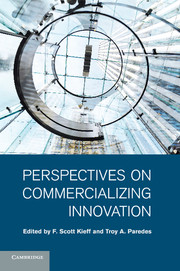Book contents
- Frontmatter
- Contents
- Contributors
- Dedication
- Acknowledgments
- Introduction
- Part I Perspectives on Theories of Intellectual Property
- 1 Intellectual Property and the Theory of the Firm
- 2 A Transactional View of Property Rights
- 3 The Modularity of Patent Law
- 4 Forging a New Environmental and Resource Economics Paradigm
- 5 Privatizing the Public Domain
- Part II Perspectives on the Problems of Anticommons and Patent Thickets
- Part III Perspectives on Finance and Commercialization
- Part IV Perspectives on the University Innovation
- Part V Perspectives on International Considerations
- Index
- References
5 - Privatizing the Public Domain
from Part I - Perspectives on Theories of Intellectual Property
Published online by Cambridge University Press: 05 December 2011
- Frontmatter
- Contents
- Contributors
- Dedication
- Acknowledgments
- Introduction
- Part I Perspectives on Theories of Intellectual Property
- 1 Intellectual Property and the Theory of the Firm
- 2 A Transactional View of Property Rights
- 3 The Modularity of Patent Law
- 4 Forging a New Environmental and Resource Economics Paradigm
- 5 Privatizing the Public Domain
- Part II Perspectives on the Problems of Anticommons and Patent Thickets
- Part III Perspectives on Finance and Commercialization
- Part IV Perspectives on the University Innovation
- Part V Perspectives on International Considerations
- Index
- References
Summary
Intellectual property ordinarily passes from private ownership to the public domain, but it is possible to imagine regimes that would selectively convert some public domain property back to private ownership. Privatization might be useful in some cases to promote further scientific development of intellectual property, to provide incentives for unpatentable improvements, to encourage commercial experiments, to generate increased advertising or marketing, and to prevent overuse. Privatization has drawbacks too, including both the familiar drawbacks of private ownership and the rent seeking that a system of privatization might entail. If selective privatization is appropriate, auctions may be the best mechanism for privatizing rights in a way that limits rent seeking, and information markets might provide a useful means for determining when privatization is appropriate.
The path from the private domain to the public domain is almost always a one-way street. Intellectual property rights may be held privately for limited periods of time, and then they fall into the public domain. Once in the public domain, an intellectual property right ordinarily cannot be reclaimed for private ownership. Typically, this is as it should be. At least in theory, intellectual property terms are designed to provide an adequate reward for the creation of the underlying intellectual property. Even if the designated term is suboptimally short for a particular category of intellectual property, once the intellectual property is created, retroactive increases in terms produce windfalls for private actors rather than social gains. According to the conventional wisdom, society ex post is better off with intellectual property in the public domain than in private hands. Public ownership eliminates the transactions costs associated with identifying and negotiating with the owners of prior intellectual property rights, and goods and services utilizing the underlying intellectual property can be sold for a lower price, increasing access to them.
- Type
- Chapter
- Information
- Perspectives on Commercializing Innovation , pp. 144 - 176Publisher: Cambridge University PressPrint publication year: 2011



